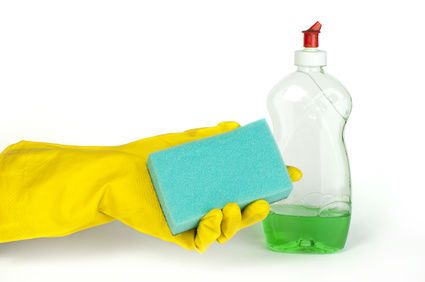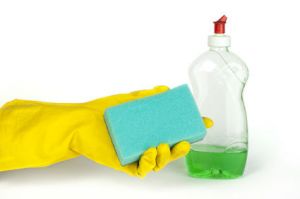
The gluten-free diet has recently been accepted as more than just the latest trendy fad diet, and has become a way of life for millions of Americans.
Unfortunately, this is in a large part due to the overwhelming number of people suffering from celiac disease or gluten sensitivity (we can thank the mass-produced genetically engineered wheat industry for that).
Nevertheless, those looking to avoid wheat no longer have to settle for a few meager tasteless products, as full ailes in the supermarket and entire sections of health food stores are dedicated to the followers of a wheat-free diet – but are gluten-free cleaning products and skin-care products going a bit overboard?
For many who think going gluten-free is nothing more than the latest trend, a gluten-free lotion may seem a bit extreme. However, for those who suffer the consequences from a even the slightest exposure, these non-food items can be a life-saver, both for the inside of their bodies and the outside.
Of those suffering from celiac disease, 12 to 25 percent won’t experience the bloating and cramping from a simple slice of bread, but rather a painful skin condition. Dermatitis herpetiformis is a variation of celiac disease that manifests itself via itchy and painful skin rashes, sores and lesions. The first symptoms include incredibly itchy eruptions of sores on the skin. Often patients scratch themselves raw, leaving the sores vulnerable to infection.
Rashes and small groups of lesions will often come second, and can be found practically anywhere on the body, most commonly on the elbows, knees and buttocks. Since these patients generally don’t present with classic celiac disease symptoms, their condition often goes misdiagnosed, generally confused with eczema or other skin ailments.
For these and the millions of other Americans whose condition results in painful consequences, a gluten-free diet is the first step to finding relief. However, avoiding wheat in daily meals may not be enough.
Gluten hides in more places than you may realize, and unfortunately, many of these non-food items are products we ingest innocently every day. This especially rings true for the skin-care products we apply directly to our faces, such as lotions and lipsticks.
One would have to be incredibly careful to avoid ingesting even a small amount of shampoo or body wash, especially if you like to belt out some tunes while lathering up.
Dish soap can be a serious concern, as residue can remain on dishes and utensils even after a thorough washing. In fact, one study was able to link hydrolized wheat used in dish soap to a potentially fatal condition called wheat dependent exercise induced anaphylaxis.
 So for those experiencing itchy sores and rashes, these may be the first telltale signs of dermatitis herpetiformis. Avoiding gluten will alleviate your symptoms and keep you from needing unnecessary tests and treatments.
So for those experiencing itchy sores and rashes, these may be the first telltale signs of dermatitis herpetiformis. Avoiding gluten will alleviate your symptoms and keep you from needing unnecessary tests and treatments.
For all those whose lives are affected by gluten, look beyond your refrigerator for triggers. Often what you put on your body, winds up in your body.
-The Alternative Daily
Sources:
http://celiac.nih.gov/Dermatitis.aspx
http://www.mayoclinic.org/diseases-conditions/celiac-disease/expert-answers/celiac-disease/faq-20057879
http://www.glutenfreecookingschool.com/archives/gluten-free-soap
http://www.ncbi.nlm.nih.gov/pubmed/22428462

